| Construction Rating: | starstarstarstarstar |
| Flight Rating: | starstarstar_borderstar_borderstar_border |
| Overall Rating: | starstarstarstarstar_border |
| Diameter: | 0.74 inches |
| Length: | 12.40 inches |
| Manufacturer: | Semroc  |
Brief:
The Hawk is a boost glider that uses a rocket engine to get itself in the air. It is a "Retro-Repro" of an
older rocket. Semroc is selling them for $7.50 right now so I decided to pick one up.
Construction:
When I bought the kit I figured there wouldn't be very many pieces. I got it and found only 5 parts in the whole kit.
It comes with:
- 1 BT-20J body tube (2 3/4" Long)
- 1 1/8" launch lug (1 1/4" Long)
- 2 balsa wood sheets (laser cut)
- 1 rolled balsa nose cone
- 1 small decal that says Hawk
- and the instructions
The instructions are perfect. They give you each step in order with illustrations. They even give you boxes to check after each step. At the beginning of all of Semroc's "Retro-Repro" rockets instructions, there is an interesting description of the company that originally made it.
The fins were easily taken out of the balsa sheet with an X-Acto knife. Some of them just fell out. I then proceeded to sand the parts smooth with fine sandpaper. The balsa wood parts have lines on them to show you where to glue them to other parts, just be careful that you don't sand to much or the lines will disappear. The balsa wood included in this kit is nice and hard, but you still need to pay attention to how and where you are sanding.
Attaching the wings is a little tricky but was not a hassle. You are supposed to invert the assembly in order for the body tube to glue on properly. You also attach the wings at this point. It is hard to get the wings to stay in place while they are gluing (if you're using wood glue), but I figured out a way to make it easier. Just apply the glue and wait a minute or two before attaching the wings. (This also works great when gluing on the stabilizer tips)
Once you have finished putting everything together you then need to add fillets to all of the joints. I found that toothpicks and Q-tips were invaluable in this step.
After that you need to sand all of the edges smooth and create an airfoil. (Airfoiling is optional.) This step was easy enough to do. I had to find a picture of an airfoil in order to figure out what I needed to do, but after that it was easy. I then tested it by flying it off of my second story deck into the grass. My glider nosedived into the grass at a right angle on the first try. I used small paper clips as weights on the rear stabilizer. I taped them on so that I could adjust them later (to make it turn). After two more throws it was ready.
I am amazed at how sturdy it is. I have never built anything out of balsa wood before and expected it to be flimsy.
All I needed to build this rocket was an X-Acto knife, some sandpaper, wood glue, and paper clips. (I'm sure you could find something better.)
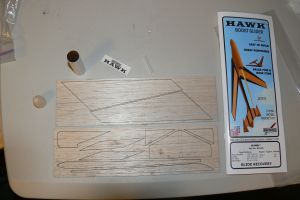
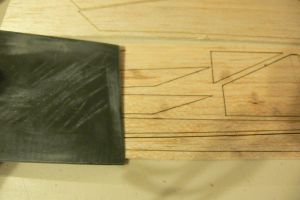
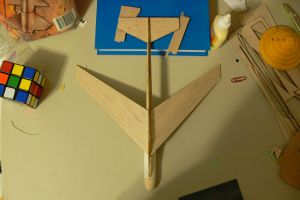
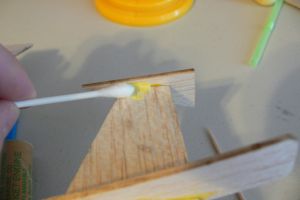
Finishing:
With boost gliders painting is not recommended. It will cause them to glide for a shorter amount of time. It is
recommended that you put one thin layer of clear coat on though, in order to protect the rocket. I did not clear coat
my rocket because I didn't have any laying around and didn't have any time to use it (as the launch was the next day).
Construction Rating: 5 out of 5
Flight:
The recommended motors for this kit are A8-3s and 1/2A6-2s. I did not have any 1/2A6-2s so I used an A8-3. I set it
up at the launch put and got ready to fly. When it launched it flew straight up, no circles, loop-de-loops or anything.
It was perfect. Then the engine burned out and the rocket continued upward. Right at apogee the ejection charge went
off. The ejection charge was so powerful it broke off the tail section! It may have been the engine hitting the rear
part of the fuselage as I can see a little bit of damage there. Then the rocket came down, ever so slowly, fluttering
to the ground. I was so mad! That wasn't supposed to happen. But I have heard that Estes engines, which are what I
used, can have an overly energetic ejection charge. I'll have to reinforce it with something next time, if there is a
next time. Oh well, I pretty sure it's repairable so I'll get on that.
Recovery:
It went up so straight that the two broken pieces landed within 15 feet of the launch pad!
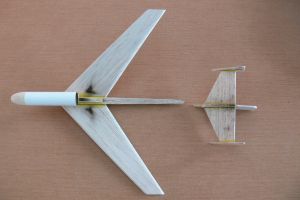
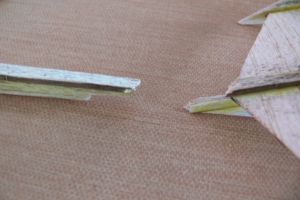
Flight Rating: 2 out of 5
Summary:
I feel that Semroc has made a very good kit with easy to follow directions. The balsa might just be a little bit too
weak to handle the forces of rocket flight though. I am going to try some of Quest's engines in it and see what
happens. Although it may have that one problem I'm sure it can be overcome somehow so I am still going to recommend it
to you. It is a fun kit to build and a great thing to launch, at least from what I saw.
Overall Rating: 4 out of 5
Other Reviews
- Semroc Hawk By Paul Morris (March 22, 2009)
Brief: A retro boost glider that was purchased for me by my nephew and niece for my birthday. This was the first model rocket that I have built since I had a stroke--and it proved a bit of a challenge. Construction: The kit comes in a bag and contains: motor mount 2 balsa sheets of parts balsa nose cone decal launch lug The balsa was light, ...
- Semroc Hawk By Matt Gillard (March 22, 2009)
Brief: A Retro-Repro production from 1965. The Hawk is a quick to build boost glider that ejects its motor and glides back down. Flies almost from the building board. Construction: Kit comes in a plastic bag and contains: 1 instruction booklet 2 3/32" balsa part sheets 1 BT-20 motor tube 1 Balsa nose cone 1 1/8" launch lug 1 Hawk decal ...
- Semroc Hawk By Robert Gustin (March 12, 2009)
Brief: The Semroc Hawk RetroRepro boost glider is a very simple to build and easy to fly rocket boosted glider. Based on the 1965 AMROCS Hawk, it ejects its motor to establish a stable, balanced glide. Construction: In the well packaged kit you get: 1 Instruction set 2 3/32" balsa part sheets 1 BT-20 motor tube 1 Balsa nose cone 1 1/8" launch lug ...
- Semroc Hawk By Jim Bassham (March 7, 2009)
Brief: This is Semroc's Retro-Repro kit of the 1965 AMROCS Hawk. It is a swept-wing boost-glider that uses motor ejection to change CG at apogee. Construction: The kit consists of a balsa nose cone, an 18mm motor tube, a launch lug, a waterslide decal, and two sheets of laser-cut balsa parts. The instructions in this Semroc kit were well written, logical, and generously ...
- Semroc Hawk By Hans "Chris" Michielssen (February 7, 2009)
Brief: I put my order into Semroc during their end of the year Christmas discount. My order was already over $40.00 and the Hawk was a free kit! I added an extra Hawk to my order. One to build, one to hoard. I had an AMROCS catalog in the early 1970s. I remember thinking it was a near twin to the Estes Falcon. With laser cut fins, this kit went together much easier than my ...
- Semroc Hawk By Howard Smart (January 31, 2009)
Brief: Near reproduction of a boost glider (BG) kit from 1965 made by AMROCS. This is a forward motor BG which changes from boost to glide by ejecting the motor casing, shifting its CG to the rear for gliding flight. Construction: This kit contains: (2) Balsa fin sheets - laser cut Nose cone - Balsa Motor mount 18mm Launch lug Decal Construction was ...
- Semroc Hawk By Chan Stevens (January 3, 2009)
Brief: The Hawk was originally introduced by Advanced Model Rocket Systems (AMROCS) in 1965. Its design is very much like the Estes Falcon. It's technically a boost glider, although it doesn't use a carrier vehicle, instead relying on ejecting the motor to handle the necessary shift in CG/CP relationship. This Semroc "retro repro" faithfully reproduces the original ...
 |
 |
Flights
Sponsored Ads
 |
 |











